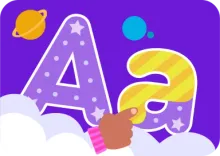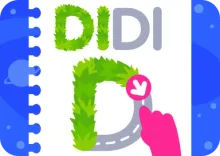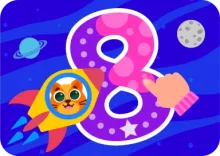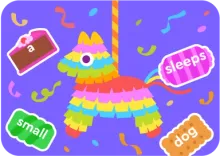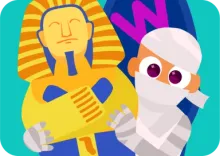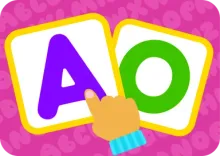Writing Learning Games – Simple Ways to Teach Children to Write
Writing games help kids practice letters and words in a low-pressure way. These activities support pencil control, spelling, and sentence building while keeping learning playful, structured, and easier to repeat.
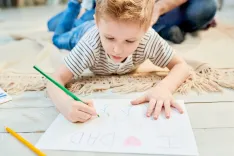
Writing games for kids to support early writing skills
Learning to write is one of the most important and sometimes most challenging stages in a child's development. However, this process doesn't have to be a routine consisting of boring copybooks and repetitions. Writing games for kids are a wonderful way to turn learning into an exciting adventure where each letter and word becomes a new discovery. Such games help children develop fine motor skills, expand vocabulary, and stimulate creative thinking, doing it naturally and effortlessly.
Therefore, we decided to gather many ideas to help you make writing lessons fun and effective. It's important to gradually introduce the child to the concept of writing from an early age, form habits, not fear and associations that it's something difficult and boring. We'll look at games you can play without gadgets, as well as those found in apps.
Write, Think, Create: Why Teach Children to Write at an Early Age?
Handwriting games for kids are not just entertainment. They are the key to developing literacy, fine motor skills, and creative thinking, as well as forming important skills that will be useful in the future. Such activities have many advantages:
- Development of fine motor skills and hand preparation for writing. Tasks where you need to draw, sculpt, or trace excellently train the small muscles of fingers and hands. This directly affects the child's ability to properly hold a pencil and write beautifully in the future.
- Expanding vocabulary and speech development. When children create stories, form words, or write letters, they actively use their vocabulary and learn to formulate thoughts.
- Stimulating creative thinking and imagination. Writing games without screens, where you need to compose stories or draw, help children develop imagination and ability for creative self-expression.
- Forming positive attitude toward learning. When writing is perceived as a game, the child doesn't experience stress and pressure. This forms a positive attitude toward learning in general, which is extremely important for school performance.
Even now, when people write less by hand, we don't recommend skipping this learning stage. Writing skill is needed not for letters or notes, but primarily for harmonious and proper brain development.

Help your child
grow with Keiki
We’ll help you turn everyday screen time
into real learning progress.
Writing practice for kids Without Gadgets – Pure Classic
These games don't require expensive materials and help children learn through tactile experience and creativity, using imagination and available materials.
Sensory Writing
In your activities, don't ignore sensory writing activities, as this is powerful practice for little ones just getting acquainted with letters. This way you can develop tactile sensations and memorize letter shapes from an early age. Instead of paper and pen, use a tray with a thin layer of sand, semolina, flour, or shaving cream. Ask the child to write letters or simple words with their finger or stick.
Letter Detectives
Name a letter, for example, "L". Ask the child to find several objects in the room or outside whose names begin with this letter. After they find, for example, "lemon," "leaf," and "lamp," ask them to write these words. This is an excellent game that develops observation skills, attention, and expands vocabulary.
Magic Message
Write a message on paper with "invisible ink" – for example, a cotton swab dipped in lemon juice. To reveal the message, you'll need to heat the sheet (very carefully, for example, hold it over a light bulb). The child will be delighted with such magic and will gladly try to write a secret message themselves.
Collage Story
Cut out different pictures from old magazines and newspapers: people, animals, objects, places. Let the child choose several of them and, using them, create and write a story. This stimulates creative thinking and helps develop coherent speech. For older children, you can complicate the task by asking them to use certain words in the story.
Mail Game
Another excellent option for writing practice for kids. Make a mailbox from a box. Suggest the child write a letter to an imaginary friend, favorite fairy tale character, or even real grandparents. This teaches letter structure, develops communication skills, and allows the child to feel the importance of their message.
Funny Stories
This is a story composition game in a circle. The first player writes the first sentence, then folds the paper so only this sentence is visible and passes it to the second player. The second player writes the next sentence, and so on. At the end, unfold the paper and read the resulting funny story. This develops creativity, listening ability, and coherent speech.

Writing Games by Age
How to teach writing to kids? Select activities by age! For games to bring maximum benefit, it's important to select them considering the child's age characteristics, interests, and existing skills.
Writing games for toddlers (1-3 years) – The Very Beginning
Yes, at this age children can't write yet and have difficulty understanding the alphabet, but preparatory tasks will prepare their hands and brain for future achievements.
Finger Painting
Give the toddler special finger paints and a large sheet of paper or even an old oilcloth. Let them draw scribbles, lines, circles. This develops fine motor skills and prepares the hand for writing, as the child learns to control finger movements.
Drawing on Back
Stand behind the child and draw a simple figure or letter with your finger, and they should guess what it is. Then switch places. This game develops tactile perception and imagination.
Clay Letters
Sculpt letters from clay. This is fun and helps remember their shape through tactile sensations. You can trace letters sculpted from clay with your finger.
Scribble Game
Draw several scribbles on paper. The child's task is to find familiar images in them (for example, house, tree, sun) and complete them. This game develops imagination and creative thinking.
Build real skills through fun, educational games for your child
Try KeikiWriting games for preschoolers (4-6 years) – First Steps in Writing
It's time to start seriously learning to write, practice, and instill useful habits.
Find the Letter
Print a page of text with large font (you can use a children's book). Ask the child to find and circle all letters A or B. This develops attention and teaches recognizing letters in text.
Fill in the Blanks
Print simple words with missing letters. For example, "a_a" or "ca". The child's task is to write in the missing letters. This is more an example of writing games for 5 year olds and older, when little ones have already mastered the alphabet and words. This helps reinforce alphabet knowledge and teaches word formation.
Write Like a Hero
Example of story writing games. Let the child choose a favorite character from a cartoon or fairy tale. Suggest they copy a favorite quote or phrase from this character. This motivates the child and makes the writing process more engaging.
Word Puzzle
Write a word on thick paper and cut it into parts. The child's task is to assemble the word from pieces. This develops logic and helps understand what parts a word consists of. You can use this game to learn new words.
Online writing games for kids – Technology Help
Recently, it's become common to separate online games and classic tasks with pen or pencil as diametrically opposite. But in reality, they can complement each other, as proven by learning app Keiki, which contains various games for developing fine motor skills, writing skills, and general tasks for learning the alphabet and new words.
Keiki is a platform where you can easily master complex topics in game form. There's no advertising, external links, or unnecessary information here, but the app also contains worksheets that can be printed. And they contain selected and compiled writing learning tasks for any preparation level. We've made a selection of useful online writing games for children from Keiki:
- Letter Tracing. Interactive writing learning tasks where the child traces letters on screen with finger or stylus. This helps remember their shape and prepare the hand for writing.
- Reading Train. In this game, you need to form word-trains into one sentence-composition so the train starts from the station and goes on a journey.
- Make a Word. A game where you need to form simple words from given letters. This develops reading skills and understanding of word structure.
- Short Stories. All skills are connected, so if a child learns to read and listen to text, they also automatically develop writing skills. Our interactive stories use a comprehensive approach.
Related Games in Keiki App
Tips for Organising Writing Learning Games
Simple learning to write games will become even more accessible and understandable if you follow several tips:
- Use different materials. Sand, clay, paints, paper of different colors and sizes. The more diverse the materials, the more interesting the process will be.
- Create a cozy space. Designate a special corner for activities where the child will feel comfortable. This could be a separate table, beautiful chair, or simply a soft rug.
- Be patient. Don't force the child if they don't want to write. It's better to postpone the activity for later. The main thing is that writing should be associated with pleasure, not obligation.
- Praise the process, not the result. Encourage the child's efforts, not just perfect letters. Note how well they held the pen or how carefully they drew a line. This forms a positive attitude toward writing.
- Make writing part of everyday life. Ask the child to write a shopping list, greeting card, or note. This shows them that writing is a useful skill, not just a school assignment.
And, of course, play and engage with the little one yourself. They naturally learn from your example. If they see you writing or leaving notes for them, they do the same. Improving handwriting begins with a conscious and involved adult.

